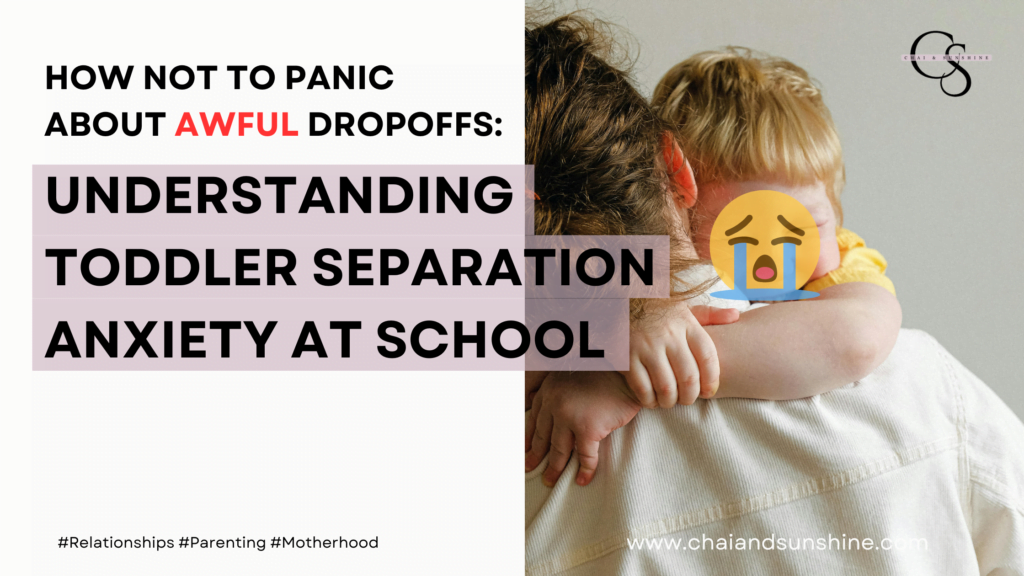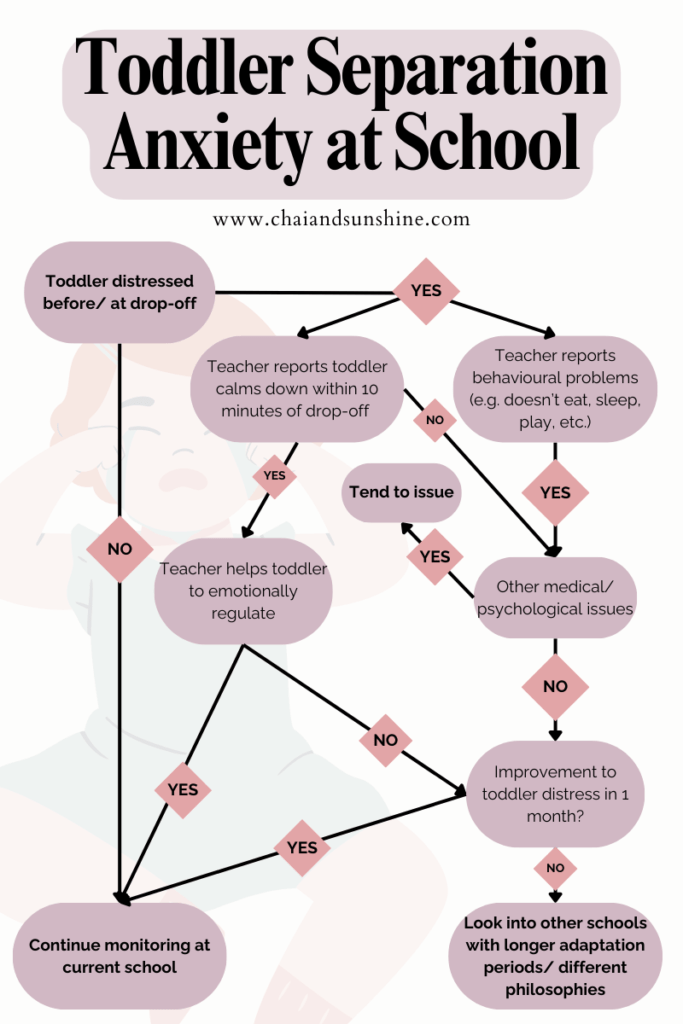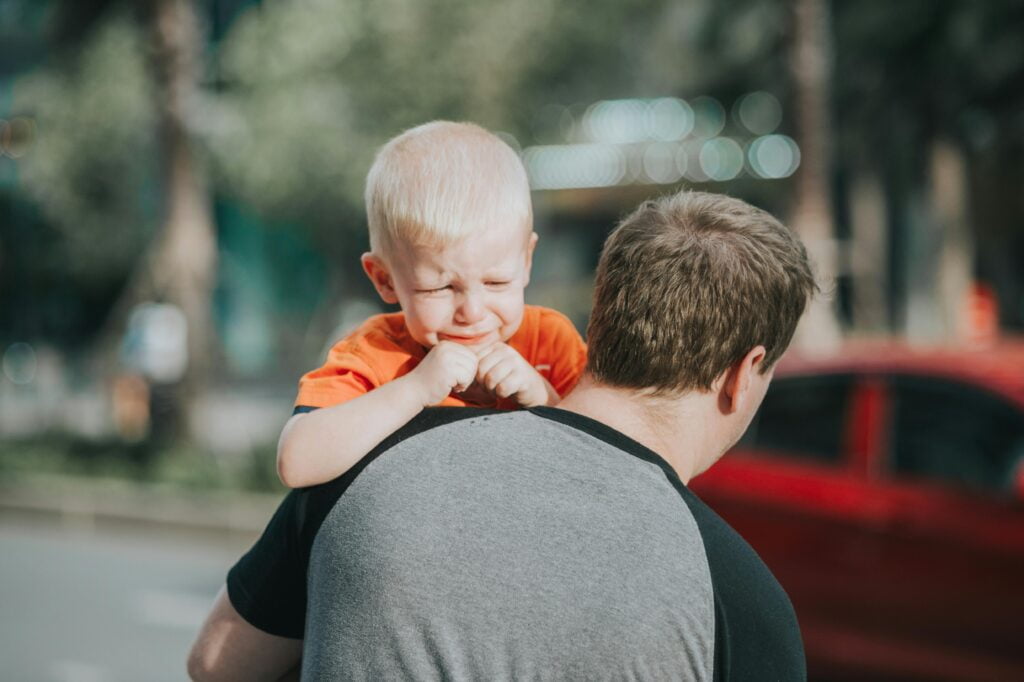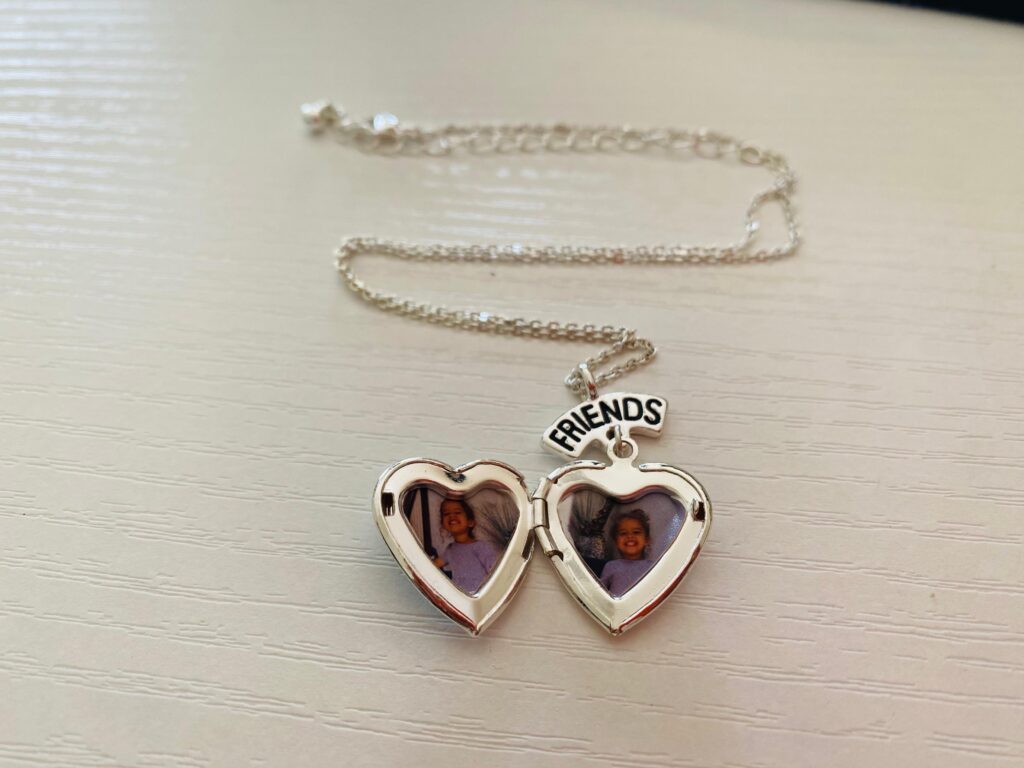
Like many parents, hubby and I were looking forward to the start of the new school year.
The girls would be away from Monday to Friday, doing fun, stimulating things, and eating a wider variety of foods.
(Our toddlers had regressed to a diet of French fries and sparkling water after an indulgent summer with their grandparents).
We even imagined that after a month of lax structures and endless adventure (including a flight back to the UK), that our girls might actually welcome the stability that came with a back-to-school routine.
Man, were we in for a rude awakening!
Our drop-offs were so dramatic and horrible that I often ended up crying. Sometimes in the car, while hubby stared out into the void, shell-shocked in his own right. A couple of times in the reception area in full view of other horrified parents.
But here we are, 3 weeks of morning dread later. But thankfully, it wasn’t all for nothing. I’ve got a few sage words for ye struggling parents facing toddler separation anxiety at school.
So, in this post, I’ll be covering:
- Tips on how to handle their emotions,
- How to handle your feelings, and
- How to decide whether there is something more worrying going on
Table of Contents
ToggleToddler Separation Anxiety at School: Adjusting Expectations
We put our girls in nursery for the first time last year, a month before their second birthday.
The school had a gradual, week-long adaptation process. And by the end of that week, our girls were at school for the full day (~9:00 – 17:30).
During that year, there were a few tearful goodbyes here and there, but there were also many confident they-didn’t-even-look-back drop-offs.
And when it came to this year, herein was our first mistake.
Expecting that they would pick up where they left off.
Here are a few of our false assumptions:
Past Performance is NOT a Prediction of Future Performance
- They were fine at the end of last year. They will be fine picking up where they left off.
The holidays may not affect your little one’s return to school if you’re lucky. But they can also be a major reset in terms of their expectations for how they think their day is about to go. This is especially true if you spent the entire holiday together, doing fun stuff. Suddenly going back to school may be a shock to the system.
- Separation anxiety is only for younger kids.
While many parenting sites talk about separation anxiety as a phase that most kids go through around 8 months of age, toddler separation anxiety at school is also extremely common. It is also not a developmental failure of the parents.
- As the toddler matures, they should also be more emotional independence.
While toddler development may be happening leaps and bounds both physically and with their language, they are also becoming more emotionally aware. This means that everything hits them harder (think of the tantrums), including goodbyes. If they’re in the hands of good caregivers who can help them regulate emotionally afterwards, they should calm down within a few minutes.
Toddler Separation Anxiety at School: A Decision Tree
When we dropped our twin toddlers at school, there were a lot of feelings flying around.
At drop-offs, they would cry, hold onto us/ our clothes, scream, beg, and even kick/ hit their teachers.
And us? Well, I already admitted to being a puddle of tears. But we also felt a lot of guilt and concern around whether we were doing lasting complex trauma-type damage to our children.
So, during week 2 when things did not look like they were getting any better, we decided to sit down and map out our options.
It looked something like this:
The Disaster Drop-off Decision Tree

You’re very welcome to use this decision tree to map out your own options with your toddlers, but bear in mind a few things.
First, the educators/ caregivers at your school need to be people you trust. If they tell you that your child is doing fine after 10 minutes at the school, you should be able to believe them. If not, and depending on where the mistrust comes from, you’d either get your kid out of that school or work on your trust issues.
And second, this decision tree presupposes that you have a good-enough relationship with your toddler. In other words, that they are comfortable enough in your presence to show or tell you about their real emotions. If not, you won’t know whether they are improving or whether they are simply too afraid to tell you they’re not.
How to Handle Big Emotions

We were told, repeatedly, that our girls were happy less than 10 minutes after drop-off. But that didn’t help us a lot.
Our parting memories of leaving them at school for the day were of our children, panicked and tear-stained, begging us not to go.
And that can be very tough to process for us adults, even if we know intellectually that they are in good hands.
Here’s how to help your toddler feel more safe and calm your own emotions, too.
Helping Your Toddler Feel Safe
Our biggest mistake, perhaps, was not adequately preparing them for school after the holidays. We somehow did not register the enormity of the change for our twins.
In fact, the first couple of days after school, their whole personalities seemed to change. One of them seemed a bit spaced out (not her character at all). While the other seemed to have some strong anger towards us (also unusual).
We worked through their confusion, anger, sadness, and more over the week. And things eventually got back to normal. But that was a bit of a shock for us.
Now, we let them know in advance that “tomorrow you’ll be going to school”. And that, even though it might be hard at first, they always have lots of fun. (Self-reported fun, we’re not gaslighting them!).
We also ended up buying some heart lockets and printing out tiny photos of our family to place in them.
“Whenever you’re feeling sad, you can look inside your heart and you’ll find mommy and daddy there.”
It seems to be working as many of the teachers have reported that they both open and close their lockets numerous times a day, showing others their mommy and daddy.
But more than that, it’s consistency. We offer lots of hugs and cuddles and let them know that we love them. The quality time together after school and on weekends makes sure they remain securely attached to us.
And that if other big feelings arise because of school, we’ll be there to help them through it.

Regulating Yourself After a Difficult Drop-Off
You know what works? What really works? Just feeling whatever you’re feelings.
That why, for the first time in my shame-based life, I allowed myself to cry in front of others.
The tears came, and instead of choking them down, I let them fall down my cheeks. A few parents came up to me in the days after. They’d witnessed me sobbing into my husband’s chest.
And admitted that they, too, cry after drop-offs. In the car. At home. Out of sight. It’s brought us all closer, knowing that we share the same concerns.
What else?
The thought that’s helped me a lot is, “Just because I feel a certain way, does not make it true.”
I then run through the facts.
- My daughters are in good hands with teachers I greatly trust and respect.
- They are happy, bubbly, and energetic 10 minutes after drop-off.
- When we pick them up, often, they don’t want to leave.
- And they are securely attached to us, and would tell us if anything were really wrong or horrible.
The Most Helpful Thing Someone Said to Me About Toddler Separation Anxiety at School
So, of course, before developing our decision tree (above), I was in full panic-mode.
I contacted alternative schools and arranged for meetings with two Forest Schools.
Perhaps, I thought, the school they were actually in was too rigid. Perhaps it was too conventional and we were stressing out our children just to fit into society.
I mean, I personally had a horrible experience at my kindergarten. It was post-apartheid South Africa, and I was the only non-South African in my grade. The experience damaging me a lot.
I wasn’t about to ignore my own toddlers’ cries like that!
So, we visited the Forest Schools and I made sure to ask about the adaptation period. And the teacher told me a story of a mom who wanted to do a “No Tears” drop-off.
“We allow parents to stay at the school with their children for as long as they’d like,” started the teacher.
I nodded, attentively. This was going well.
“So, when this mother decided to do a “No Tears” drop-off, it was fine with us. Except that she ended up accompanying her daughter for 8 months, full-time, and still did not achieve a “No Tears” drop-off.”
“Excuse me????” I thought while remaining composed.
“You see,” the teacher continued. “Toddlers who are securely attached will often cry when you leave them. It doesn’t mean they aren’t happy at school. It just means that they’re sad to see you go.”
“As long as they’re fine after a few minutes, and are able to feel comfortable and themselves throughout the day, you have nothing to worry about.”
Final Thoughts
Parenting is NOT easy. Every stage of it comes with it’s own set of trials. And with new milestones comes toddler separation anxiety at school.
It’s not pleasant. It’s not easy. Especially if you’re highly attuned to your children’s feelings.
But if you keep yourself regulated, look at the facts, and maintain a good-enough, trusting and secure relationship with your toddler, I’m confident that things will work out.
For inspiration: one of our toddlers went over to her teacher confidently today. No tears, lots of waving goodbye. She looked confident and happy, and it warmed our hearts. (The other one cried less intensely than usual, which we are also taking as a small victory!).
Comment with your own stories and suggestions. I’d love to hear them. Parenting should be a community activity – let’s learn from each other.
